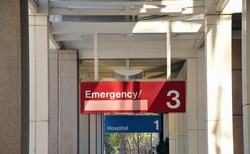
© Copyright 2016 Storma Sire
Emergency Room for the Sickle Cell Patient:
- Stay calm. Do what you can to keep calm and breathing deeply.
- Sometimes we Sicklers hide our pain. After a lifetime of battling severe pain we wear it well. This works for us and against us as nurses and doctors may underestimate the situation when we are in emergency and wait too long to give pain medications, oxygen, or hydration / IV. There can also be a stigma against Sicklers as well - doctors or nurses don't believe you, or think your a drug seeker, or forget about you in the din of chaos in the emergency rooms. It is vital to communicate things with health care professionals as best we can. And always bring your own prescriptions / pain medications, just in case.
- Ask your doctor and pain management specialist to create a pain management program and medication schedule that you can take to the hospital with you. Make sure you doctor signs and dates it with their contact information on it to prevent delays in the emergency room.
- Some pain medication they administer may have side effects, so make sure they let you know what they are giving you and whether you have any allergies to opioids. Some people are allergic to opiods and may have difficulty breathing, so make sure you communicate what you are feeling to the doctors and nurses. Suggest to them to be put on oxygen, just in case.
- Your immune system may sometimes be low, so make sure the people around you aren't sick with colds or flus if you can help it. Bring a small bottle of hand sanitizer and some alcohol wipes to disinfect sinks and toilets you will be using. If you are at the hospital consider wearing a mask to protect yourself. There are some aromatherapy oils that are anti-viral and/or antibacterial (ie. Manuka oil, eucalyptus oil, blood orange oil, cinnamon oil, lavender oil, clove oil, lemon oil, thyme oil, pine oil, tea tree, sage, rosemary oil, peppermint oil, oregano oil, basil oil, etc) , consider putting a small amount in your mask or on a handkerchief if you think you may be exposed to colds, flus, or superbugs. When returning home from the hospital and you think you may have been exposed, wash your hands when you get home and wipe down your keys, bag, ipod, book, or anything else you may have touched (ie. wallet, library books, new purchases, etc) with disinfectant. This may sound extreme, but colds and flus seem to be stronger and more resistant. If our immunity is already low then it is worth the extra effort to be cautious.
- When everything is sorted and you are more comfortable try to sleep, listen to relaxing music, talk with a friend, or visualize yourself getting well again.